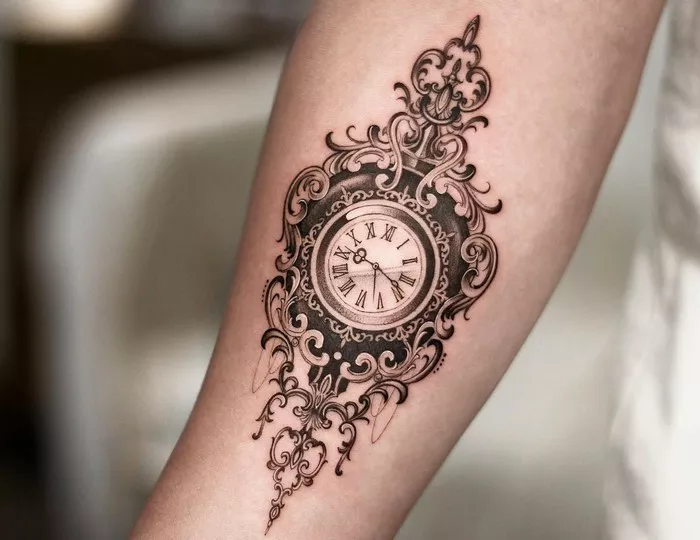In the vast lexicon of tattoo symbolism, few motifs carry the weight and complexity of the clock. A timeless emblem, the clock serves as a potent metaphor for a multitude of concepts ranging from mortality and the passage of time to punctuality and destiny. Clock tattoos have adorned the skin of individuals across cultures and epochs, each imbued with personal significance and interpretation. In this comprehensive exploration, we delve into the rich symbolism behind clock tattoos, unraveling their layers of meaning and uncovering their resonance in contemporary tattoo culture.
A Symbol of Time: Embracing the Passage of Life
At its essence, a clock is a device that measures time, capturing the ceaseless flow of moments as they transition from past to present to future. In the realm of tattoo symbolism, the clock is often embraced as a potent reminder of the impermanence of life. Encapsulating the fleeting nature of existence, a clock tattoo can serve as a poignant memento mori, urging the bearer to seize the day and live each moment to its fullest.
For many, a clock tattoo represents an acknowledgment of mortality and the inevitability of death. It serves as a sobering reminder of the finite nature of human life, prompting introspection and a deeper appreciation for the preciousness of time. In this context, the clock becomes more than a mere instrument of timekeeping; it becomes a symbol of existential contemplation, prompting the bearer to reflect on their own mortality and the legacy they wish to leave behind.
Symbolism Through Design: Exploring Variations in Clock Tattoos
One of the most fascinating aspects of clock tattoos lies in the diversity of designs and styles that can be employed to convey their symbolism. From ornate pocket watches to minimalist hourglasses, each iteration of the clock carries its own unique connotations and aesthetic appeal.
The pocket watch, with its intricate detailing and vintage charm, is a popular choice for those seeking to evoke a sense of nostalgia and timeless elegance. Often adorned with filigree patterns and adorned with symbolic imagery such as roses or skulls, pocket watch tattoos exude a sense of romanticism and mystique, inviting the viewer to contemplate the passage of time and its profound impact on the human experience.
In contrast, hourglass tattoos offer a more minimalist interpretation of the clock motif, focusing on the visual representation of time as a finite resource. Symbolizing the inexorable march of time, the hourglass serves as a potent reminder of the transient nature of life, urging the bearer to make the most of each passing moment. With its simple yet evocative design, the hourglass tattoo resonates with those who seek to embrace the impermanence of existence and find beauty in life’s ephemeral nature.
Cultural Significance: Clock Tattoos Across the Globe
While the symbolism of clock tattoos transcends cultural boundaries, different societies have imbued these motifs with their own unique meanings and associations. In Western cultures, where the clock is synonymous with punctuality and efficiency, clock tattoos often symbolize a commitment to productivity and time management. For individuals in high-pressure professions or those striving to achieve their goals, a clock tattoo may serve as a constant reminder of the importance of staying focused and making the most of every moment.
In Eastern cultures, where the concept of time is often viewed through a more philosophical lens, clock tattoos may carry deeper spiritual significance. In traditions such as Buddhism and Hinduism, time is seen as cyclical rather than linear, with the past, present, and future existing simultaneously in a continuous loop. For adherents of these belief systems, a clock tattoo may represent the interconnectedness of all things and the eternal cycle of birth, death, and rebirth.
Modern Interpretations: Reshaping the Meaning of Clock Tattoos
In recent years, clock tattoos have experienced a resurgence in popularity, driven in part by their versatility and timeless appeal. In an era marked by rapid technological advancements and constant connectivity, the symbolism of the clock has taken on new dimensions, reflecting the anxieties and aspirations of contemporary society.
For some, a clock tattoo may serve as a symbol of resistance against the relentless march of time, a defiant declaration of autonomy in the face of life’s uncertainties. In an age defined by hustle culture and the pressure to constantly be productive, a clock tattoo can serve as a reminder to slow down, savor the moment, and prioritize self-care.
Others may interpret the clock tattoo as a symbol of empowerment and transformation, embracing the idea that time is not a constraint but a catalyst for growth and change. By embracing the impermanence of life, the bearer of a clock tattoo may find liberation from fear and hesitation, emboldened to pursue their dreams and aspirations with renewed vigor.
Conclusion
In the tapestry of tattoo symbolism, few motifs possess the depth and resonance of the clock. From its humble beginnings as a humble timekeeping device to its status as a potent emblem of mortality and destiny, the clock has endured as a timeless symbol of the human experience.
Whether adorned with intricate detail or rendered in minimalist elegance, a clock tattoo serves as a powerful reminder of the passage of time and the fragility of life. It prompts us to contemplate our mortality, cherish each fleeting moment, and embrace the beauty of the present.
As we adorn our bodies with these timeless symbols, we weave ourselves into the fabric of history, joining a lineage of individuals who have sought to capture the essence of time in ink and skin. In doing so, we honor the past, celebrate the present, and embrace the infinite possibilities that the future holds.

